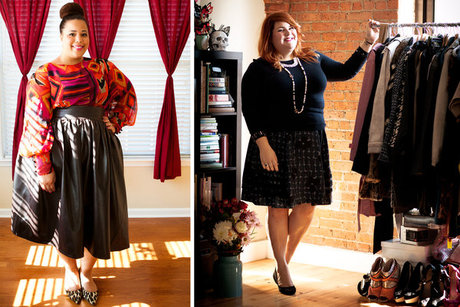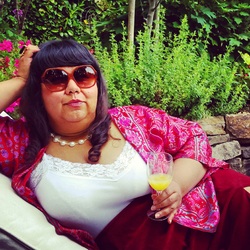|
In today's New York Times post, "Plus-Size Bloggers Are Role Models," Bethany Rutter of Arched Eyebrow, spoke about how fatshion can lead to people “...examining their relationship with their body for the first time, questioning why they feel they should lose weight or why they feel they don’t deserve to enjoy fashion.” Bethany's words made me think about my history with fashion and the ways that fatshion has become such an integral part of the body liberation movement - and why.
I come from a long line of fatshionistas. My grandmother, Esperanza, was a master seamstress - having learned all her skills from her mother, Manuela - until she got Parkinson's. Her sewing subverted the patriarchy of my grandfather, who was threatened by her skills and her secrets; they subverted the post-production capitalism we had inherited, which said we could abdicate those skills in favor of mass-produced looks palatable to Western aesthetics; they subverted the thin-centric clothing manufacturers who said there was no room for her body or mine. My mother, Maria, liked to use glittery puffy paint to enhance denim skirts she'd turned into minis. She'd draw entire scenes from The Little Mermaid on the pockets of the skirts, and she'd turn discarded, seemingly hopeless things into elaborate and beautiful gifts for me. She made me leopard-print jumpers and fashioned my hair into gloriously high side pony tails. She helped me practice fierce quippy one-line retorts to defend my body against the rapid onslaught of attacks it constantly buffeted. I didn't have the skill to understand their labors of love. I hated that I couldn't find clothes in my size. I didn't want to be special or seen. Clothing has always made me interact with my body in a very real way. As a little fat girl, it was clothing that became symbols of my body's failure to conform, and as a grown & ferosh fat lady, it is clothing that has become a claim to visibility and a challenge to conquer, alter and radicalize. I have to understand the dimensions of my body - how wide my upper arms are, how big my bust is, how my hips are shaped, how many inches I need to account for when I sit down (and my belly pops more!) - when I'm buying or altering clothes. I feel like my wardrobe - the hair birds, the sequins, the tiny veiled hats, the endless nautical-themed outfits - is part of my healing process. It's the intentional flouting of feminine convention. It's the conscious refusal to make others feel comfortable by putting my lumps away. It's laying to rest my old, little girl ambitions of invisibility. And it's laying claim to a new politic of customized disobedience. Comments are closed.
|
Virgie Tovar
Virgie Tovar, MA is one of the nation's leading experts and lecturers on fat discrimination and body image. She is the founder of Babecamp (a 4 week online course focused on helping people break up with diet culture) and the editor of Hot & Heavy: Fierce Fat Girls on Life, Love and Fashion (Seal Press, 2012). She writes about the intersections of size, identity, sexuality and politics. See more updates on Facebook. Archives
April 2021
Categories
All
|




 RSS Feed
RSS Feed